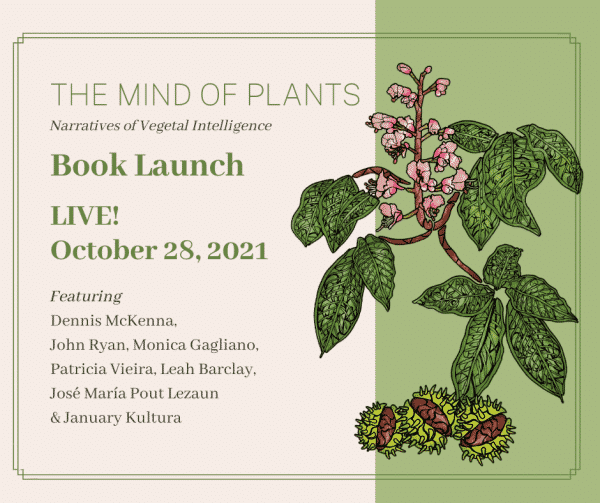It’s often the things we take for granted that have the most potential to provide significance and meaning in our lives. Like many things in our environment essential to our being and our becoming, plants are commonly overlooked, and so it might not feel natural or even useful to ask, are plants conscious? It can come as a surprise to learn that more than ninety-nine percent of all biomass on our planet consists of plants. They have an enormously consequential presence in our lives and yet in many ways we can easily misunderstand the nature of these fascinating beings.
When we raise the question of what it is like to be a plant, a different picture begins to emerge, though we must remain aware of how easy it is for us to project the qualities of our own subjectivity into the answers we come up with.
The specific question of whether plants are conscious remains open and our approach to answering this query informs the type of answer we arrive at. In the recently published book, The Mind Of Plants: Narratives of Vegetal Intelligence, a diverse group of authors, poets, naturalists, and social scientists examine their own connections to plants and elaborate on the questions and answers that these relationships produce. The editors of this collection intend to “inspire fresh ways of seeing—of feeling and of being with—the photo-synthetic personae with whom we share this precious, imperiled planet.” It is with this spirit of openness to a new phenomenology that our questions will prove most rewarding and conducive toward gleaming whether plants are conscious, and what we can learn from their intriguing and mysterious experience.
What is Consciousness?
A clear definition of what consciousness is has continued to elude consensus and, much to the dismay of apostles for scientific materialism, there continues to be ample disagreement regarding whether their current theories can accurately describe the faculties of consciousness displayed by earth’s organisms.
The Oxford Living Dictionary defines consciousness as “the state of being awake and aware of one’s surroundings.” If we think of consciousness as the state of being aware of one’s surroundings it seems that plants qualify, after all, many plants direct the growth of their roots based on the amount of nutrients they encounter in soil and they extend their branches toward the direction where light emanates from. However, more nuanced definitions of consciousness include the ability to be aware of oneself, and to be intentional, or to have volition. Even with these more demanding constraints on the definition of consciousness, it is not immediately apparent that plants can be disqualified. Although consciousness is evidently and notoriously difficult to explain, certain characteristics of what we consider consciousness have been clearly observed within plants.
Examples of Plant Consciousness
In recent years the debate over whether to classify plants as conscious or not has developed with several factions presenting evidence and making competing claims. There have been important publications that support the idea that plants are conscious including a study published last year in the journal Nature which examined the patterns of growth exhibited by the common bean as it sprouts and seeks a feasible path for its limbs. The researchers found a difference in how the beans grew when placed in a pot with a cane which they could grab hold of or when placed in an empty pot. This seems to suggest that the plants have some kind of sense which allows them to know if there was anything for them to climb on or not.
Arguments Against Plant Consciousness
There are of course many scientists who for several reasons believe that we cannot properly call plants conscious. Many of these points are outlined in a paper published in 2019 in the Journal Cell in which a group of biologists and plant physiologists argue that consciousness is too complex of a state for us to attribute it to the plant behavior observed. One of the authors of that paper, Lincoln Taiz, is a botanist working at UCLA who believes that proponents of plant consciousness fail “to consider the importance of brain organization, complexity, and specialization for the phenomenon of consciousness.”
Monica Gagliano, a professor in the School of Biological Studies at the University of Western Australia, and co-editor of The Mind of Plants, responds to this by pointing out that if plants are conscious we should not expect the mechanisms by which consciousness is correlated in physical systems to necessarily be the same.
Rethinking Plant Intelligence
Plant Neurobiology is the recently developed field of study that looks at “how plants process the information they obtain from their environment to develop, prosper and reproduce optimally.” By rethinking plant intelligence, this field is providing new perspectives for how we view and relate to plants. Botanist Stefano Mancuso is Director of the International Laboratory of Plant Neurobiology which proposes renewing our view of plants by understanding them as “information processing organisms with complex communication throughout the individual plant.” The areas which Mancuso and his colleagues work on include plant behavior, plant intelligence, and plant signaling. In their research, they take the view that “plants are dynamic and highly sensitive organisms… capable of a refined recognition of self and non-self…”
The legacy of Western historical perspectives continues to be challenged and it seems in some ways science is approaching a closer balance with the view held by Indigenous knowledge for time immemorial that plants are conscious and even teachers. Let us accept that we are invariably influenced by the underlying ontology that we absorb and uphold. But, let us also acknowledge that our own mysterious capacity to reflect in consciousness allows us to play with our imaginative capacity and thus perform both measurements and interpretations of what consciousness is like on the far side of our subjective divide.
 The Mind of Plants Book Launch Event
The Mind of Plants Book Launch Event
World renown ethnobotanist and researcher Dennis McKenna, PhD, will give an introduction at a global, live-stream event to celebrate the publication of The Mind of Plants: Narratives of Vegetal Intelligence, on October 28.
The Mind of Plants event will feature the book’s editors, John Ryan, Monica Gagliano, and Patricia Viera as well as reflections from José María Pout, whose illustrations bring the plants to life throughout the collected works. Multi-instrumentalist January Kultura will also provide a deep listening experience for event attendees.

 The Mind of Plants Book Launch Event
The Mind of Plants Book Launch Event